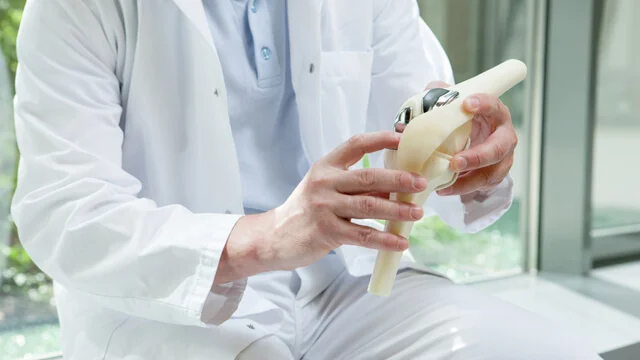Total Knee Replacement (TKR) Surgery
Our Orthopedic Surgeons at King’s College Hospital Dubai, have performed over 10,000 Total Knee Replacement (TKR) surgeries.
Total Knee Replacement, also called Total Knee Arthroplasty is a surgical procedure that is done to restore function and relieve pain to a degraded knee joint. It involves using artificial prosthesis such as high-grade plastic, polymers or metal alloys to cap or replace the ends of the bones that form the knee joint together with the kneecap.

Knee replacement surgery at King’s – What can you expect.
The knee is a complex joint that consists of three bones:
- Thighbone (femur)
- Tibia (shinbone)
- Patella (kneecap)
Strong ligaments connect the thigh and calf muscles to the bones around the knee thus controlling the knee function and motion. Cartilage and other soft tissue cushion and cover the bones helping them to glide together smoothly. When you straighten or bend the knee, the end of the femur moves against the end of the tibia making the patella to glide in front of the femur.
When the cartilage that cushions the joint is worn away or degrades completely, the bones rub together and become rough or scraped. This results in osteoarthritis which causes pain and limits movements that involve bending the knee such as getting in and out of chairs, climbing stairs or walking. The knee may also swell since the joint is not stable.
Total knee replacement surgery is done to treat disability and pain in the knee which is most commonly caused by osteoarthritis.
Patient Testimonial – Dr Shine & George | TKR – Osteoarthritis & Arthrofibrosis
How to Prepare for Total Knee Replacement Surgery
Before the total knee replacement surgery, the joints that are adjacent to the diseased knee – ankle and hip – have to be carefully evaluated. This done to ensure that the patient will have optimal recovery after the surgery. Having a severely damaged joint adjacent to the knee joint that being replaced may hinder the results of the surgery and make the nearby joint more painful if it is abnormal.
If the patient is taking any medications they will be reviewed and he/she will be asked to avoid taking blood thinning and anti-inflammatory medication or the intake can be adjusted.
Routine blood and urine tests will be performed to check the function of the liver and kidneys. EKG and Chest x-ray are also performed to exclude significant lung and heart disease.
It is also important that before you go in for the surgery that you arrange for someone who will help you around the house for a week or two after the surgery. Your physician may request other specific arrangements based on your medical condition.
The Procedure
Total knee replacement surgery is done under either general anesthesia in which the patient will be unconscious or spinal anesthesia in which the patient will be awake but will not feel pain from the waist down.
Intravenous antibiotic will be administered before, during, and after the procedure to help prevent post-surgical infection.
The surgery begins by the surgeon making an incision into the tissue to access the kneecap (patella) and quadriceps muscles which are located on top of the upper leg. The quadriceps are then moved to reveal the femur and tibia. The damage on the bones are cut off, smoothed, and the implant is installed. The incisions are repaired after the installation.
Minimally Invasive Knee Surgery Techniques
There are several technique options that your surgeon might use during the total knee replacement surgery. The most appropriate approach will be used for your condition. At King’s our Orthopedic Surgeons are experts in the most minimally invasive muscle-sparring approaches. With these techniques there is no cutting of muscles and tendons ensuring optimal and quick recovery, with minimal pain.
Post-Procedure Guidelines
After the total knee replacement surgery, you may stay in the hospital for a couple of days or you maybe discharged the same day if relevant home support is in place. You will be prescribed pain medication to help with the discomfort.
You will be encouraged to move your ankle and foot so as to increase blood flow to the leg muscles thus preventing blood clots and swelling. To further protect against swelling and clotting, you will be given blood thinning medication and encouraged to wear compression boots or support hose.
A physical therapist will guide you on how to exercise the new knee. Most activities can be resumed within three to six weeks after the surgery.
What are Risks of Total Knee Replacement Surgery
Just like with any other surgical procedure, knee surgery also carries risks with the main ones being:
- Infection in the artificial joint and blood cots are the main risks
- Wear and tear of the artificial joint requiring a knee revision
-> Back to Joint Replacement Page
-> Back to Orthopaedics Department

Faqs
الأسئلة الأكثر شيوعا
Knee replacement surgery (arthroplasty) is a popular surgical operation that involves removing fragments of the damaged bones that make up the knee joint and replacing them with artificial implants fabricated from plastic and metal. After that, acrylic cement is used to adhere the prosthetic joint to the kneecap, shin, and thighbone.
Medical conditions including osteoarthritis, hemophilia, knee deformity, and rheumatoid arthritis typically require knee replacement surgery. A worn-out or injured knee joint that makes it difficult to move around could need surgery. Furthermore, if you have exhausted all other non-operative treatment options, such as, walking supports, anti-inflammatory drugs, injections, or physical therapy but you are still in pain even when lying down, it might be time to consider surgery.
The majority of newly replaced knees should last for at least 10 to 14 years but around 5% –10% of knee replacement surgeries may not survive that long. In case this happens there might be a need for a knee replacement surgery.
You will most likely wake up with your knee elevated and cushioned in a continuous passive motion machine to reduce swelling. To increase blood circulation in your leg, you might need to use a compression sock. Additionally, your doctor will recommend blood thinners (anticoagulant medicine) to lower the risk of a blood clot and intravenous antibiotics to lower the chance of contracting an infection. Antibiotics can help prevent infections, but if one does arise after knee surgery, being aware of the signs and symptoms beforehand may be helpful.
Yes, after knee replacement surgery, scarring will develop as part of the body’s wound-healing process since the incision is extensive and deep. The normal incision size for a knee replacement can be up to 10 inches. Fortunately, you can manage scarring using topical silicone gel sheeting that reduces scar thickness and color amelioration.
Following a total knee replacement, knee clicking, or clunking is typical. Movements between the implant’s metal and plastic components cause the clunking, which is entirely normal. You should, however, consult a doctor if the clicking noises are accompanied by discomfort, inflammation, joint deformity, or if a new unfamiliar noise pops up. The noises should lessen with time.
King’s College Hospital is recognized for having the best knee replacement surgery center in Dubai.
King’s College Hospital London in Dubai provides the best knee replacement surgery in Dubai.
BOOK AN APPOINTMENT







